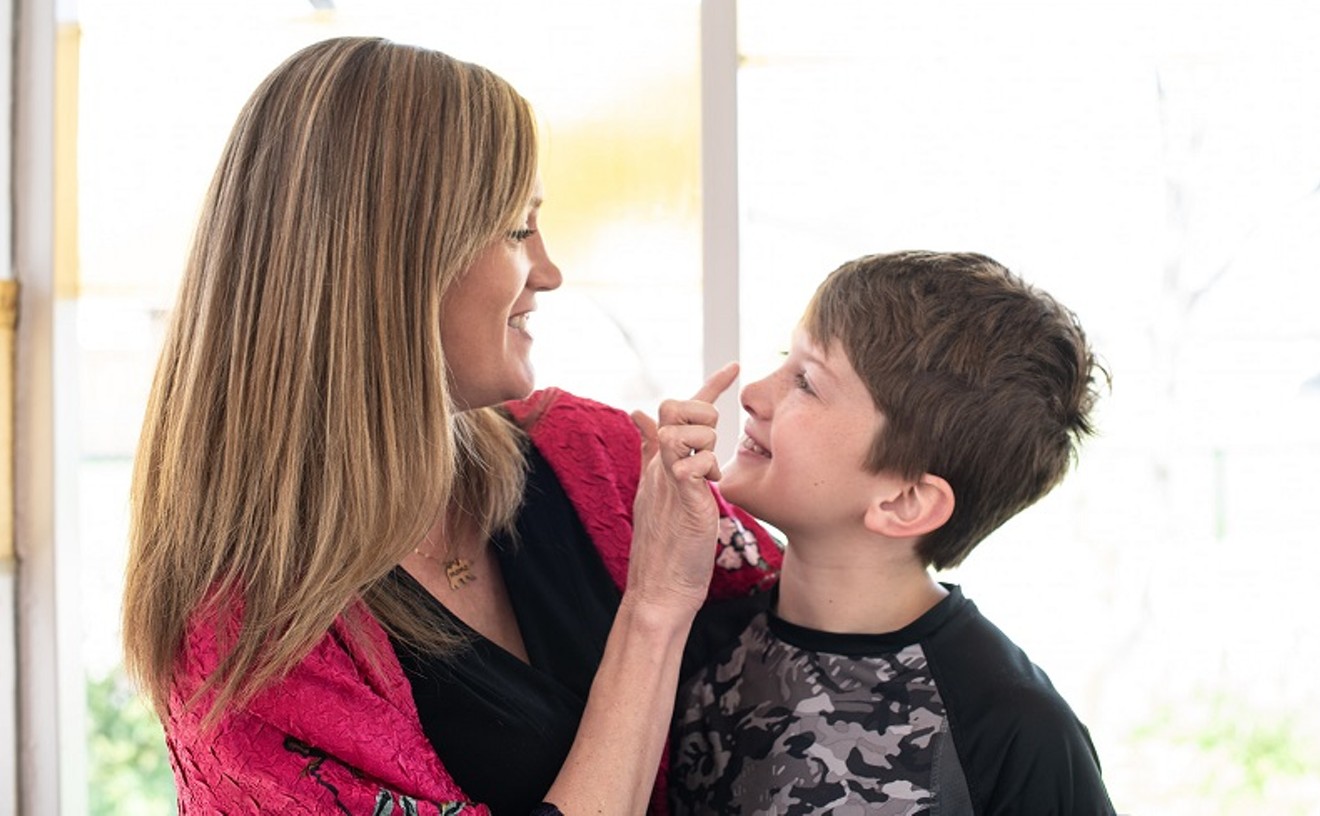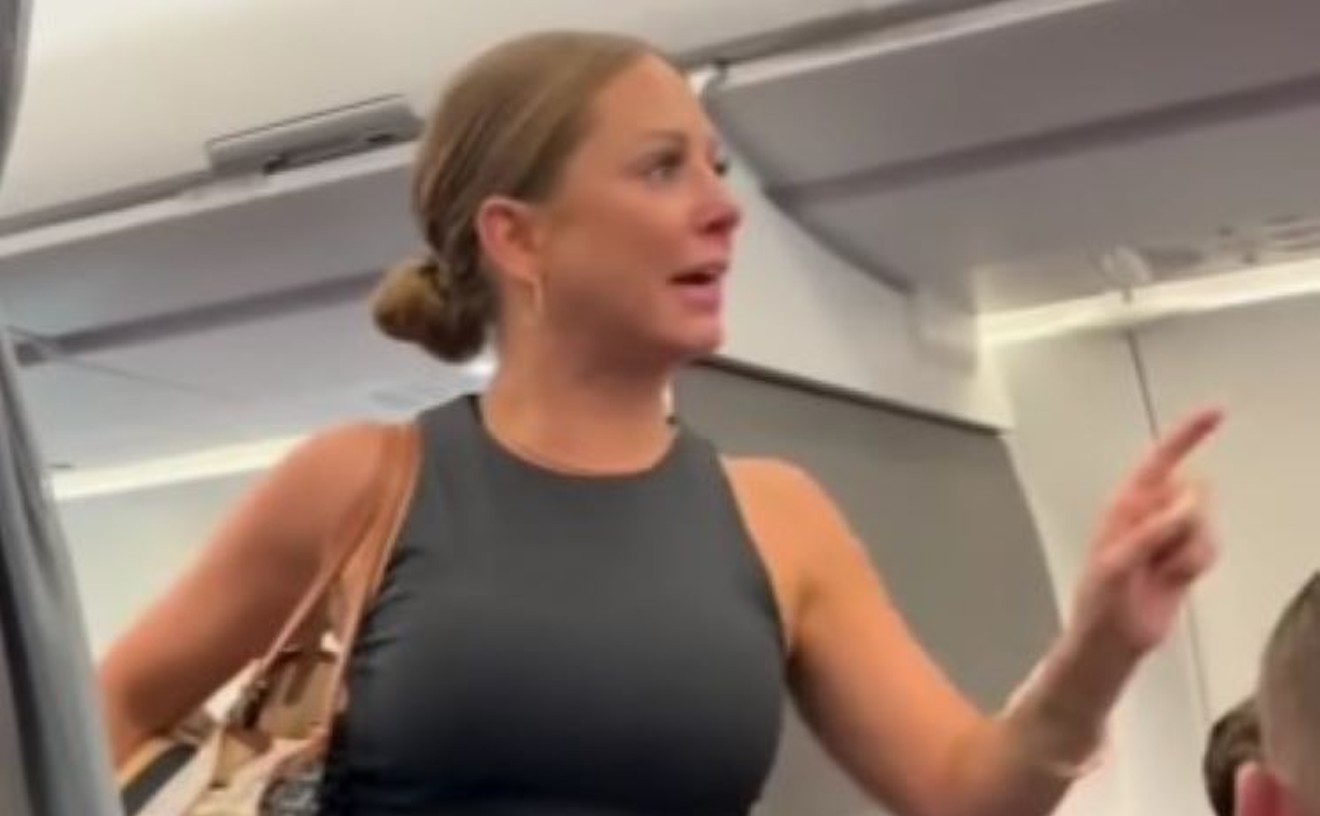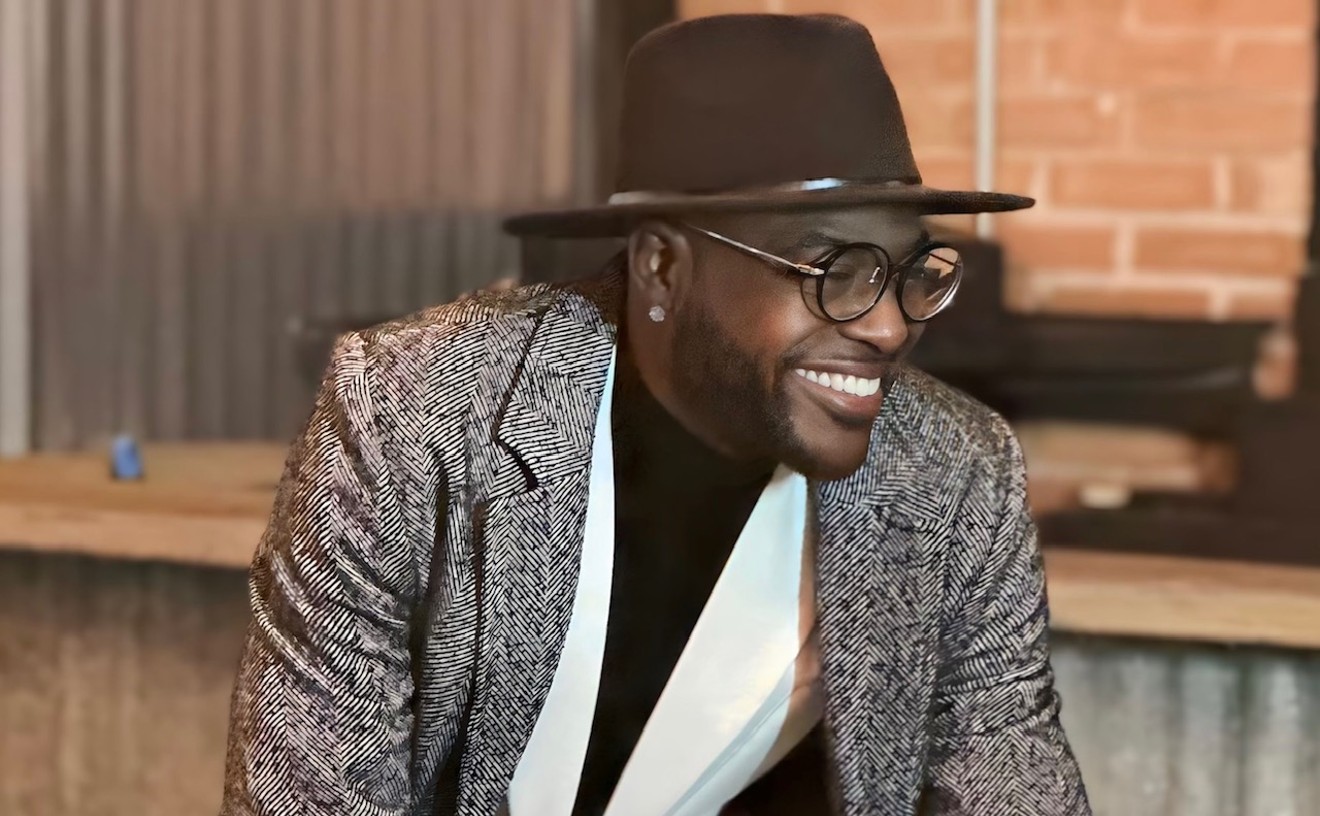This is how British playwright Alan Ayckbourn cleverly imagines the future of television in his play Comic Potential, now getting a knee-slapping-funny run at Theatre Three. Given the swill passing for prime-time viewing this fall, not to mention the lousy acting, Ayckbourn's premise doesn't seem that farfetched.
The show-within-this-show is the bottom-dwelling soap Hospital Hearts, whose ratings are toast and whose overacting "actoids" keep getting their tings tongueled up in the idiotic dialogue. On the brink of cancellation by the network's harridan of a regional manager, Miss Pepperbloom (Rebecca Graham), the show barely hangs on with the help of an aging director, Chandler Tate (Vince Davis). He's a gravel-voiced burnout case whose glory days were spent behind the camera for Hollywood's great comedy films of the mid-20th century.
Disgusted at having to shove a bunch of balky 'bots around a sound stage, Tate swigs whiskey and bemoans his situation. "We're not even television," he grumbles. "We're local television."
He treats his actoids--always referred to as "it"--with only a little less respect than some directors regard real actors. "My mother's Cuisinart has more sense than you have," Tate barks after a blown cue.
Then something unusual happens. One of the computerized thespians, a pretty blond nurse character nicknamed "Jacie Triplethree" (Dana Schultes), ad-libs during a taping. She's genuinely funny, something actoids aren't programmed to be.
A young American writer, Adam Trainsmith (Michael Turner), has happened by the studio to pay homage to Tate, his favorite director of old movies. Adam quickly sizes up Jacie's potential talent as a pie-in-the-face, double-take-tossing comedienne in the manner of Gracie Allen or Zasu Pitts.
Soon Adam, who also happens to be the nephew of the network's reclusive billionaire owner (Chris Messersmith), is cooking up a comedy TV special for his lovely little Stepford pal to star in. Oh, and no surprise, he develops a hefty crush on the mechanized cutie whose hardware is soft in all the right places. With this turn of plot, the play takes off on a hilarious When Harry Met Synthetic Sally road trip that includes a cafe scene reminiscent of Meg Ryan's date with that dish of coleslaw.
Comic Potential is the prolific Ayckbourn's 53rd play, and it's one of his funniest. (He's often called the British Neil Simon, but these days that's not much of a compliment.) Ayckbourn expertly sets up the obvious Pygmalion theme early on but then goes deeper (and funnier), exploring complex ideas about the very nature of comedy and comic timing, as well as commenting on the specific characteristics that set human beings apart from the actoids. Both "species" speak, feel and react mostly from prerecorded scripts reflecting past experience. The more human Jacie becomes, it seems, the more mechanical the rest of the "real" people appear.
Throughout the play fall those light little notes of genius that mark Ayckbourn as a great playwright. When Jacie feels romantic, her inner "soundtrack" automatically clicks on, filling the air with syrupy fake jazz. Encountering a situation she hasn't been dialed up to act in, Jacie resorts to canned dialogue from the many cop shows and disease-of-the-week movies she's been assigned to over the years. "All I have is my past life," she explains to Adam, "and I'm always getting killed."
She even has to break the news to him that actoids don't have sexual organs (though they do have "waste units" that have to be emptied now and then...you don't want to know how). It's a confession as sweet and embarrassing as any a young girl might have to make to a first love.
Playing all these shades of comedy, romance and naïveté requires just the opposite of an actoidal performance, and Theatre Three director Jac Alder has picked a gem of a Jacie in Dana Schultes, an actress with made-by-Mattel looks and funny-from-birth talent. She's adorable to watch, whether emoting as the dumb blond nurse of Hospital Hearts or coming to life as the confused 'toid whose once-predictable emotions are toyed with by the smitten Adam.
Michael Turner as Adam is good, too, in that lovably bouncy, slightly dumb sitcommy way Matt LeBlanc is as Joey on Friends.
Stealing every scene he's in as the billionaire's wheelchair-pushing "communicator," Marmion, is the impossibly skinny and statuesque Justin Martindale, tottering atop 6-inch do-me pumps and shrieking his lines in a saucy Puerto Rican patois.
The rest of the cast is only about half as good as these three in their portrayals of various actoids, production assistants and other incidental roles. Only one part in this production seems seriously miscast--Rebecca Graham as the evil Miss Pepperbloom. She's supposed to lust wildly after young Adam, but the actress playing the part looks old enough to be his grandmother, and that's not funny any way you slice it.
The good news is, Adam and Jacie carry the play, and the actors in these roles never miss a beat.
Patty Korbelic Williams dresses the cast in brightly colored futuristic threads that combine shiny plastics, see-through acrylics and the occasional peacock feather. The scene where Adam takes Jacie dress shopping is made even funnier by the appearance of several out-of-this-world outfits.
As social satire, Comic Potential hits some deliciously right-on notes about vapid television programming and the disdain corporate media types have for employees and consumers. The motto of the media empire that owns Hospital Hearts is "Nothing personal."
There's also a rather sweet bit of discourse on the power of love that achieves everything message-wise that Spielberg didn't onscreen in his bloated futuristic turkey, A.I. In Comic Potential, Ayckbourn shows that with love, Adam can make Jacie nearly human. But with that humanity come unexpected side effects. Newly empowered as an actress and as a woman, Jacie gets her first taste of ambition. Like her human counterparts in LaLaWood, it turns out that what she really wants to do is direct.
Theatrical asides:
Theatre Three has added one additional midweek matinee performance for all its shows this season, designed for groups, students, seniors or others who can't get to the theater at night. For Comic Potential, the special matinee will be at 2 p.m., Thursday, November 14...In last season's musical Side Show at Theatre Three, singer-actresses Jennifer Freeman and Julie Stirman were joined at the hip playing the Hilton sisters, conjoined songbirds warbling their way through life as carnival freaks. The singers are joining forces, but not body parts, again next month in a two-night cabaret-style concert performance titled Unattached. "We just like singing together," Stirman says. The show will run November 3 and 5 at Theatre Three. Call 214-871-2933...Terry Dobson, now directing Theatre Three's next show, the musical revue Beguiled Again, recently learned that an arrangement he did of Elton John's "Rocket Man" for The Turtle Creek Chorale will be heard on an upcoming episode of HBO's drama series Six Feet Under. Dobson's vocal arrangement of the tune will be performed for the show by the Los Angeles Gay Men's Chorus.










